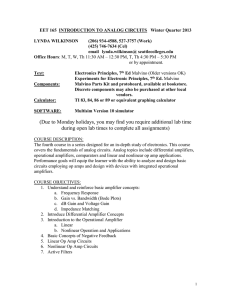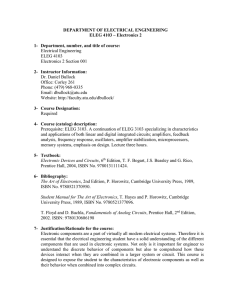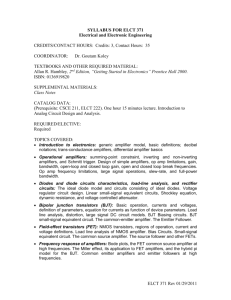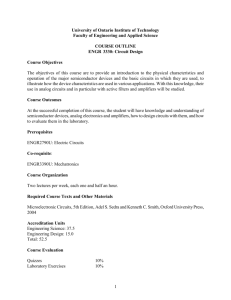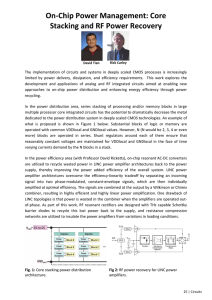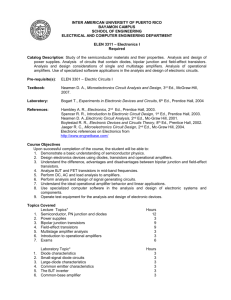EET 165 INTRODUCTION TO ANALOG CIRCUITS Winter Quarter... LYNDA WILKINSON 528-4588, 527-3757 (Work)
advertisement
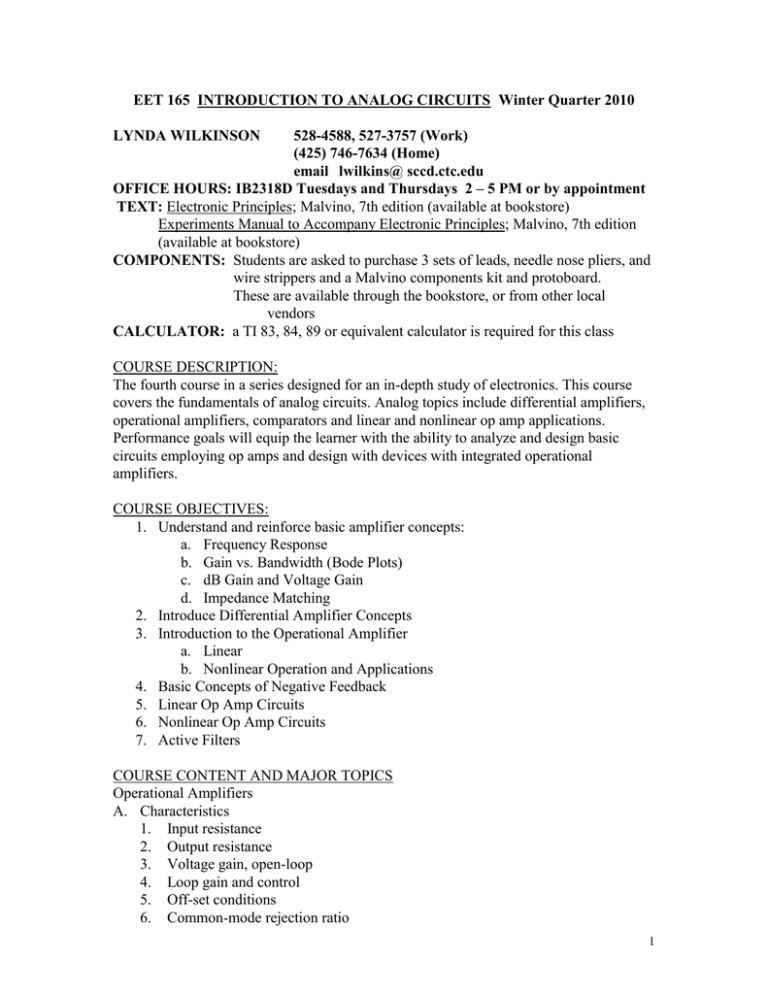
EET 165 INTRODUCTION TO ANALOG CIRCUITS Winter Quarter 2010 LYNDA WILKINSON 528-4588, 527-3757 (Work) (425) 746-7634 (Home) email lwilkins@ sccd.ctc.edu OFFICE HOURS: IB2318D Tuesdays and Thursdays 2 – 5 PM or by appointment TEXT: Electronic Principles; Malvino, 7th edition (available at bookstore) Experiments Manual to Accompany Electronic Principles; Malvino, 7th edition (available at bookstore) COMPONENTS: Students are asked to purchase 3 sets of leads, needle nose pliers, and wire strippers and a Malvino components kit and protoboard. These are available through the bookstore, or from other local vendors CALCULATOR: a TI 83, 84, 89 or equivalent calculator is required for this class COURSE DESCRIPTION: The fourth course in a series designed for an in-depth study of electronics. This course covers the fundamentals of analog circuits. Analog topics include differential amplifiers, operational amplifiers, comparators and linear and nonlinear op amp applications. Performance goals will equip the learner with the ability to analyze and design basic circuits employing op amps and design with devices with integrated operational amplifiers. COURSE OBJECTIVES: 1. Understand and reinforce basic amplifier concepts: a. Frequency Response b. Gain vs. Bandwidth (Bode Plots) c. dB Gain and Voltage Gain d. Impedance Matching 2. Introduce Differential Amplifier Concepts 3. Introduction to the Operational Amplifier a. Linear b. Nonlinear Operation and Applications 4. Basic Concepts of Negative Feedback 5. Linear Op Amp Circuits 6. Nonlinear Op Amp Circuits 7. Active Filters COURSE CONTENT AND MAJOR TOPICS Operational Amplifiers A. Characteristics 1. Input resistance 2. Output resistance 3. Voltage gain, open-loop 4. Loop gain and control 5. Off-set conditions 6. Common-mode rejection ratio 1 B. C. D. E. F. 7. Slew-rate 8. Stability 9. Spec sheet analysis Performance 1. Differential mode 2. Common-mode 3. Feedback factors 4. Frequency compensation 5. Single and dual ended outputs 6. Required power supply 7. Decoupling technique 8. Amplifier bandpass cures 9. Noise analysis Configurations 1. Voltage amplifier (series-parallel) 2. Transresistance amplifier (parallel-parallel) 3. Transconductance amplifier (series-series) 4. Current amplifier (parallel-parallel) Linear - Applications of op-amps 1. Integrators 2. Differentiators Non-linear - Applications of op-amps 1. Clippers 2. Clampers 3. Precision rectifiers 4. Level detectors 5. Instrumentation amplifiers Active filters 1. Review of filters 2. Functional analysis (Butterworth) 3. Active a. Single feedback b. Multiple feedback c. Voltage controlled 2 EET 165 Week 1 2 3 4 5 6 7 8 9 10 11 12 Course Schedule Date January 4, 6 January 11, 13 January 21 January 25, 27 February 1, 3 February 8, 10 February 17 February 22, 24 March 1, 3 March 8,10 March 15, 17 March 22, 24 Spring Quarter 2009 Content Differental Amplifiers Differental Amplifiers (con’t) Operational Amps Operational Amps (con’t) Negative Feedback Linear Op- Amp Circuits Term Test Linear Op- Amp Circuits Linear Op- Amp Circuits Non-Linear OP-Amp Circuits Non-Linear OP-Amp Circuits Review, last Test REV: May 21-09 Chapter 17 17 18 18 19 20 20 20 22 22 Lab 38 39 40 41 42 44 45 46 48 49 52 Due 1/13 1/20 1/27 2/3 2/10 2/17 2/24 3/3 3/10 3/17 3/22 Labs will be both simulated on Multisim, and breadboarded/tested. Note: The last day of the quarter is Wednesday, March 24 Class will not meet January 18 and February 15 In case of inclement weather, call my office number for class cancellation information. As EET 165 is a career preparation course, your attendance, as on any job, is mandatory. If you are unable to attend class please contact me by phone or email prior to class. Up to ten points may be deducted from your score for lack of attendance without prior approval. 3 Grade Breakdown EET 165 Quizzes and Homework 2 Written Tests Labs Weekly participation and performance TOTAL 30 pts. 30 pts. 30 pts. 10 pts. 100 pts. Labs are to be turned into instructor by 4:20 PM, Wednesdays following week that they are assigned. Each lab must be signed off by instructor as it is completed, no credit will be assigned to labs not signed off at the time of their completion. 2 points will be deducted each day homework, labs or other assignments are late without prior approval (stuff happens). Grade Assignment 98 - 100 points 4.0 96 - 97 3.9 94 -95 3.8 92 -93 3.7 90 - 91 3.6 88 - 89 3.5 87 86 85 84 83 82 81 80 79 78 77 76 75 74 3.4 3.3 3.2 3.1 3.0 2.9 2.8 2.7 2.6 2.5 2.4 2.3 2.2 2.1 73 72 71 70 69 68 67 66 65 64 63 62 61 60 2.0 1.9 1.8 1.7 1.6 1.5 1.4 1.3 1.2 1.1 1.0 .9 .8 .7 Additional labs and homework may be assigned during the quarter. Missed tests and exams may be made up by students only through prior approval. 4
